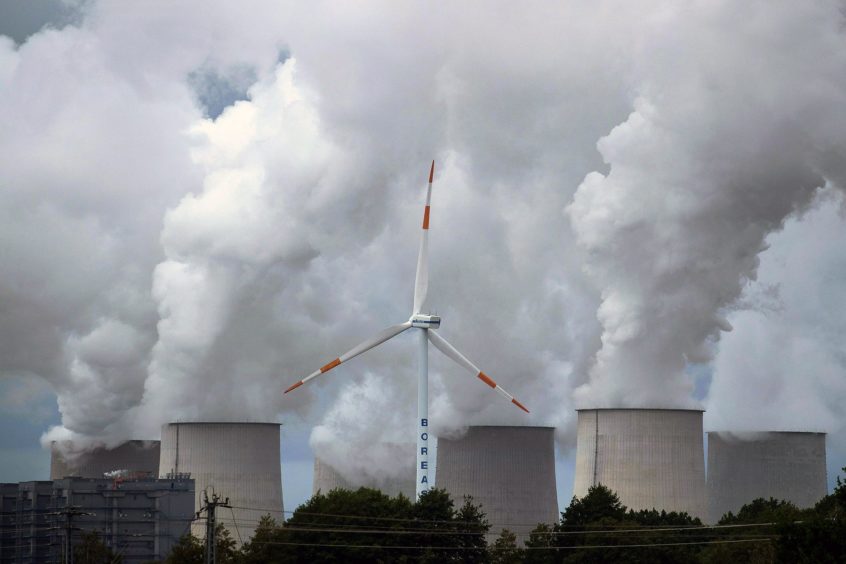
European Union leaders failed to reach a deal on how to react to the unprecedented gas crisis that sent energy prices to record levels after Poland and the Czech Republic demanded stronger action to cap the costs of pollution.
After two rounds of heated talks at a summit Thursday in Brussels, the heads of government dropped plans to adopt a statement on the energy crunch. The differences in their assessments of the spike in power, natural gas and emissions costs proved insurmountable, according to two diplomats with knowledge of the talks. A planned regulation by the EU’s executive arm on how to classify nuclear energy and gas in the bloc’s green rulebook was also a contentious issue.
Most countries in the 27-nation bloc have already taken national measures to blunt the impact of the crisis on businesses and consumers, including tax cuts and direct support for the most vulnerable households. With no signs of easing, the rally is stoking concerns about inflation and risks to the economic recovery as gas shipments from Russia, the EU’s biggest supplier, remain limited.
Carbon permits in the EU Emissions Trading System rose to a record 90.75 euros ($102.73) per metric ton last week and are trading almost 150% higher this year. Power prices have also hit all-time highs.
“The EU ETS fell over and is not working,” Polish Prime Minister Mateusz Morawiecki told reporters after the summit. “I hope that today Poland, with some support from other countries, successfully inspired the European Commission and other nations to re-think the system.”
The EU emissions cap-and-trade program imposes decreasing pollution limits on more than 11,000 installations owned by manufacturers, power generators and airlines. The bloc is currently discussing a deep reform of the market to align the program with stricter climate targets for 2030. It involves accelerating the emissions cuts, a move that will make permits more scarce.
Earlier during the debate, Morawiecki blamed financial investors for driving the surge in carbon costs, an issue also echoed by other east European countries, including Czech Republic and Hungary, according to accounts from the diplomats, who asked not to be identified because the talks were private. Poland, which relies predominantly on coal for electricity production, did not find support for its demand to be allowed a temporary opt-out from the the EU’s ETS.
German Chancellor Olaf Scholz told leaders the price of 90 euros per metric ton of carbon dioxide was hard and that 60 euros sounded more reasonable, but noted that it might be difficult to maintain that price as the broader system changes. The new government in Berlin said last month it would consider a long-term national carbon price floor of at least 60 euros if the emissions price dropped below such levels in the next few years.
Spain voiced concerns about high prices, yet Prime Minister Pedro Sanchez stressed at a briefing after the summit that he found “total questioning of the ETS” completely unacceptable.
France called for actions to reduce volatility in the market. French President Emmanuel Macron and Bulgarian President Rumen Radev also criticized a report by the EU energy regulators agency on the design of the power market and a preliminary assessment of carbon market by the European Securities and Markets Authority. ESMA last month dismissed concerns over abuse in emissions trading, saying the surge in prices was driven by economic and political factors.
“The reports, in my opinion, are not as deep as necessary,” Radev told reporters in Brussels. “And we expect, and that’s the promise of the European Commission, that this analysis will continue, that it’ll reach a greater depth and that there should be transparency both in the emissions mechanism and in the power exchanges.”
Researchers at the Potsdam Institute for Climate Impact Research urged the EU to strengthen supervision of the carbon market to avoid distortions driven by financial investors, according to a report published Wednesday.
The summit also exposed a divide between leaders over the planned rules on the role of nuclear energy and natural gas in the EU green investment classification. The commission has said it plans to present a regulation before this year on whether those two energy sources can get a clean label. The issue pits countries led by Luxembourg, Germany and Austria criticizing the potential inclusion of nuclear and gas in the so-called taxonomy against a group comprising France, Poland and the Czech Republic.
“We have discussed this in the last days and we will continue in the next days, to find a good Franco-German compromise, but which is not the condition for what remains a delegated act taken by the commission,” Macron told reporters at a joint press conference with Scholz after the summit.
Recommended for you
